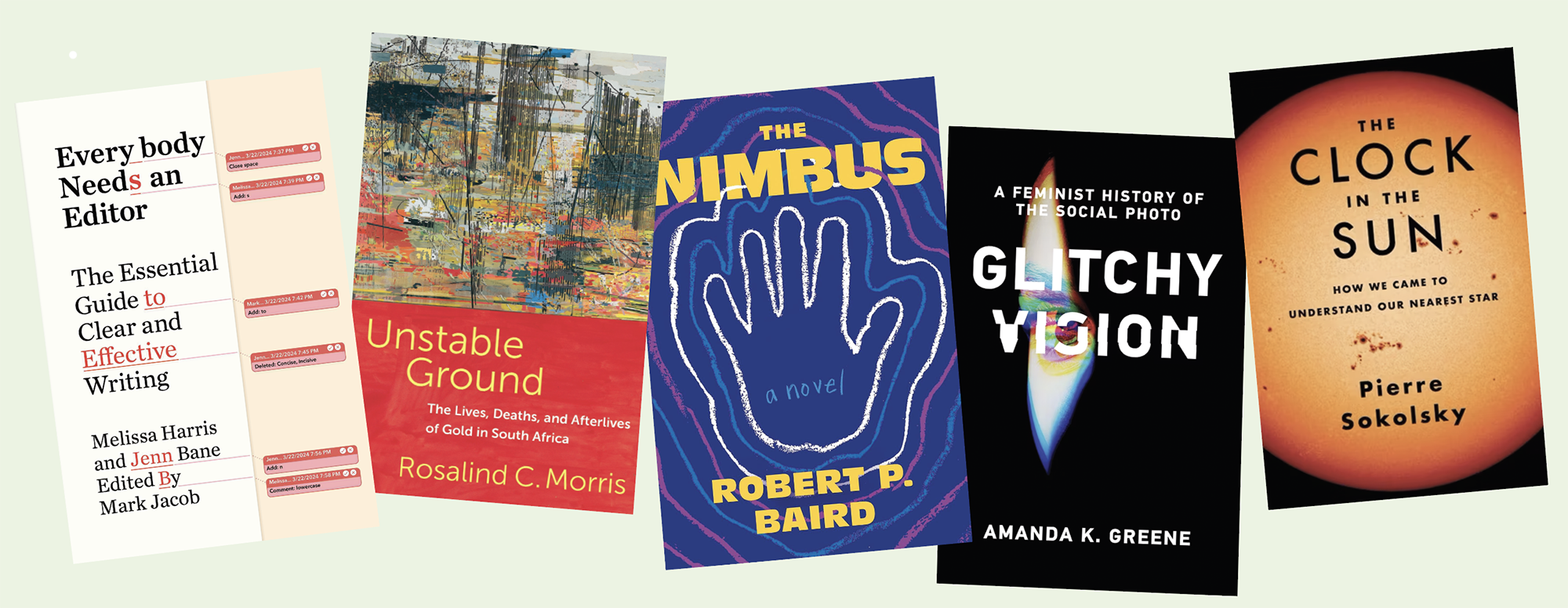
A selection of books, films, and recordings by UChicago alumni.
Everybody Needs an Editor: The Essential Guide to Clear and Effective Writing
By Melissa Harris, MBA’16, and Jenn Bane; Simon and Schuster/Simon Element, 2024
Drawing on their backgrounds in journalism and marketing, Melissa Harris and Jenn Bane share strategies for communicating effectively in the workplace, whether in résumés, social media posts, presentations, conversations with colleagues, or even toasts. The authors walk readers through problematic first drafts and stylistic flaws, highlighting common pitfalls and suggesting improvements. Also offering general tips for getting by in an office setting—such as when (or when not) to reply all to an email—the book is aimed particularly at people just entering the workforce.
Unstable Ground: The Lives, Deaths, and Afterlives of Gold in South Africa
By Rosalind C. Morris, PhD’94; Columbia University Press, 2024
Rosalind Morris draws on 25 years of fieldwork to reveal how the history of gold mining has shaped contemporary society in South Africa. She focuses on South Africa’s Witwatersrand, an area that used to be rich with gold mines. Today, miners known as zama zamas continue to carry out dangerous informal mining operations in the Witwatersrand’s abandoned mines. Morris brings together ethnography, history, and literary analysis to immerse readers in social worlds that have been shaped by the pursuit of gold.
The Nimbus
By Robert P. Baird, AM’03, PhD’10; Henry Holt and Company, 2025
One October day in a neo-Gothic building at an unnamed university in Chicago, the two-year-old son of divinity school associate professor Adrian Bennett begins to glow. The nimbus, as the glow comes to be known, reshapes the lives of everyone who comes across it, sending the Bennett family into a crisis and affecting other members of the community, including Warren Kayita, a librarian and divinity school alumnus pursued by a violent criminal, and Adrian’s graduate student Paul Harkin. Robert P. Baird’s debut novel is a satire of academia and an exploration of spiritual belief in a secular age.
Glitchy Vision: A Feminist History of the Social Photo
By Amanda K. Greene, AB’10; The MIT Press, 2024
Amanda K. Greene studies photographic innovations from 1930s Europe—photographs in the tabloid press, Lee Miller’s retouched pictures of celebrities and deceased Nazi officials, and the “street-level-seeing” images of the Mass-Observation Movement—to explore how photographic media affect the human body. She identifies “glitches” that arise in each of these instances: Studying the disruptions that occur when the human body interacts with technology, she posits, can reveal how technology has impacted our understanding of and assumptions about the body. Greene also applies digital-age concepts of real time, algorithmic filters, and sousveillance (the inverse of surveillance, used to describe recording from “below” rather than from an authority figure) to the media of the 1930s. She draws new insights from these anachronistic terms and establishes a lineage between earlier photographic forms and our current media environment.
The Clock in the Sun: How We Came to Understand Our Nearest Star
By Pierre Sokolsky, AB’67; Columbia University Press, 2024
Whether seen as a deity or a predictor of business success, the sun has repeatedly been at the heart of humans’ attempts to understand the world around us. Experimental particle astrophysicist Pierre Sokolsky provides a comprehensive history of the science of the sun from antiquity to the present. Focusing on discoveries related to sunspots and the solar cycle, he shows how our current understanding of the sun came to be. In the process, he offers portraits of the people responsible for these discoveries and illuminates the ways in which ideas travel and evolve between cultures and across time.
